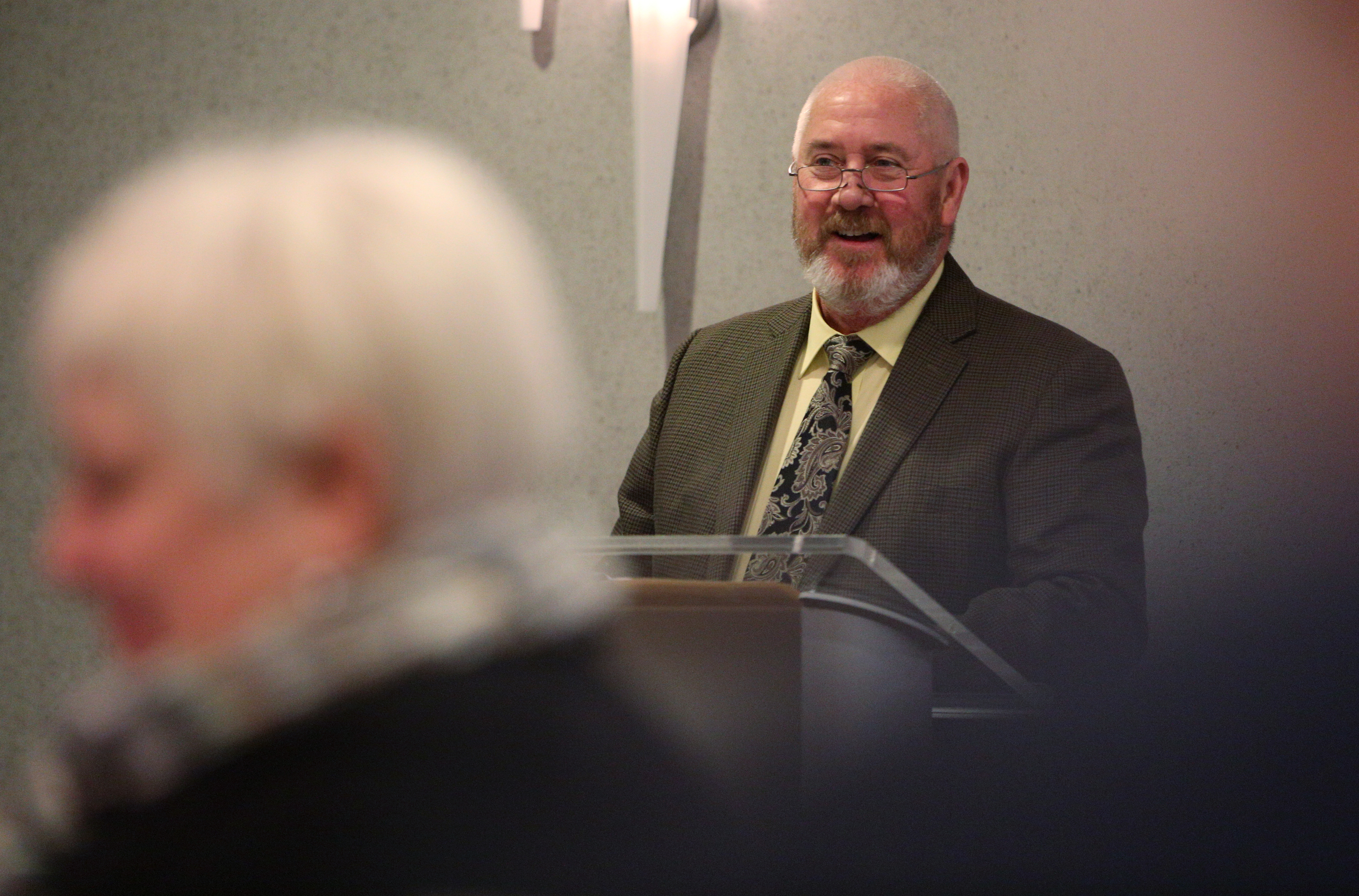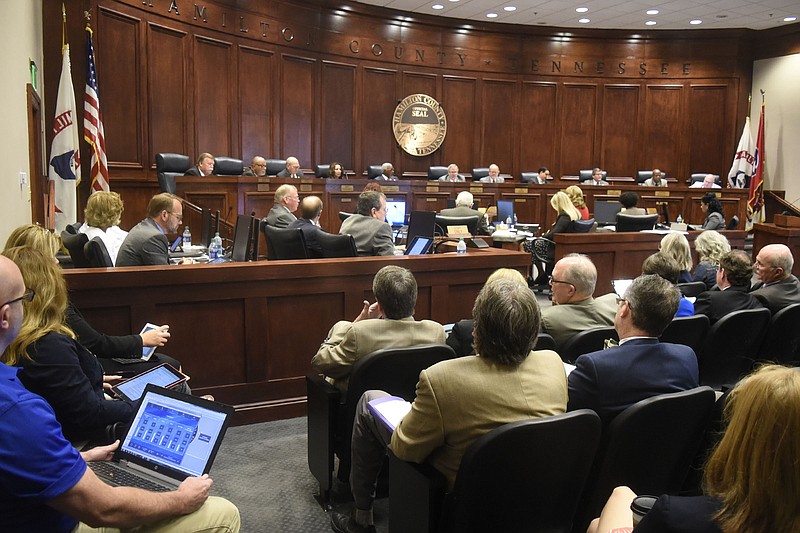A bevy of local court officials told Hamilton County commissioners on Wednesday it would be a bad idea to change their system of judicial commissioners.
Two General Sessions judges, District Attorney Neal Pinkston and Criminal Court Clerk Vince Dean all spoke in support of the current system, which uses four full-time judicial commissioners, or magistrates, to set bonds and sign warrants on nights and weekends at the county jail.
 District attorney Neal Pinkston gives a statement following a sentencing hearing for Woodmore bus driver Johnthony Walker in Judge Don Poole's courtroom at the Chattanooga-Hamilton County Courts Building on Tuesday, April 24, 2018, in Chattanooga, Tenn. Walker was convicted in February of criminally negligent homicide and a host of lesser charges, and he was sentenced Tuesday to four years in prison.
District attorney Neal Pinkston gives a statement following a sentencing hearing for Woodmore bus driver Johnthony Walker in Judge Don Poole's courtroom at the Chattanooga-Hamilton County Courts Building on Tuesday, April 24, 2018, in Chattanooga, Tenn. Walker was convicted in February of criminally negligent homicide and a host of lesser charges, and he was sentenced Tuesday to four years in prison.
"I think the magistrate job is one of the most important jobs imaginable," Judge Christie Mahn Sell said at a Security and Corrections Committee hearing. All the commissioners except Warren Mackey, who wasn't present for the commission meeting before the committee hearing, stayed to listen.
Pinkston added that the potential problems, from slowing down jail processes to added liability for the county, could "far outweigh what the savings could be."
County commissioners have been revamping the magistrate program since a state ruling last year that magistrates can't practice law on the side.
They boosted the pay from $63,000 to $80,000, with automatic annual bumps to $92,000 to match the pay of other local judges. They also temporarily extended the terms for Chief Magistrate Randy Russell and magistrate Brandy Spurgin-Floyd while they looked at options. Those terms were supposed to be reappointed May 1, and commissioners plan to interview candidates Wednesday for the posts.
Last week, Commissioner Joe Graham proposed a wholesale magistrate makeover. He suggested naming one chief magistrate who would work full time. The chief magistrate would supervise a roster of part-timers from the ranks of local attorneys, who could keep up their practices.
Graham said that could expand the pool of magistrates, provide extra income for local attorneys and save as much as $400,000 a year. Commissioner Greg Martin said the savings were hypothetical since the commission had not received required reports from the magistrates on the number of cases they handle and hours they work.
But Graham's proposal ran into solid opposition from Russell and the other officials.
Russell, who has been a magistrate for eight years and chief for five, said the state ruling meant part-time magistrates could come only from the ranks of attorneys who practice civil law.
"Civil attorneys are not well-versed in criminal law, and that's all we do," he said.
Judges Sell and Clarence Shattuck, Pinkston and Dean all discussed the depth of legal knowledge magistrates need about the law as well as bonding regulations.
The commissioners are focused on their fiduciary duty to be careful with the county's money, but the court officers have to be concerned about due process, they said.
A mistake on a search or arrest warrant, a badly drawn order of protection or an irregular bond could result in harm to county residents, to cases being dropped because of legal errors, and liability for county government, they said.
 Criminal Court Clerk Vince Dean speaks about clerk fees and e-filings in criminal cases during a legislative breakfast Thursday, Jan. 4, 2018 at the Doubletree Hotel in Chattanooga, Tenn. Dean opposed legislation that will lower clerk fees, supports efforts to strengthen requirements for proof of indigence at the Sessions Court level and supports legislation that will enable e-filings in criminal cases to be accepted.
Criminal Court Clerk Vince Dean speaks about clerk fees and e-filings in criminal cases during a legislative breakfast Thursday, Jan. 4, 2018 at the Doubletree Hotel in Chattanooga, Tenn. Dean opposed legislation that will lower clerk fees, supports efforts to strengthen requirements for proof of indigence at the Sessions Court level and supports legislation that will enable e-filings in criminal cases to be accepted. Commission Chairman Randy Fairbanks wasn't happy with Graham's proposal, either, questioning how much Graham had researched it before raising it from the dais.
Graham said he had been contacted by several local attorneys but hadn't spoken to the judges or the DA's office, wanting first to know if his colleagues even liked the idea.
Fairbanks said he wanted to hear from the court officials.
"You're making a proposal to change a major, major program that was started here by previous commissioners," Fairbanks said to Graham.
After the visitors spoke, commissioners had few questions.
Chester Bankston thanked the judges, Dean and Pinkston, saying, "Ya'll are the experts, ya'll are the ones I'm going to listen to. From what I hear, this would be a disaster" if the commission switched to part-time magistrates.
Sabrena Smedley noted that due process for defendants is a serious issue and added, "Sometimes you get what you pay for."
Added Greg Beck, who spent years as a court officer, " As far as I'm concerned, we're on the right track in the first place."
Boyd said he would write up a recommendation for the committee to consider. After the meeting, he said he intended to have it ready before commissioners start candidate interviews next week.
Travel boost nixed
Commissioners also went on the record Wednesday against a proposal to double their travel budget for the coming fiscal year.
Fairbanks had asked for the extra money in the commission budget for fiscal 2019.
He told the Times Free Press on Wednesday that Beck and Mackey had asked him to get the travel budget raised from $12,500 a year to $25,000. The request was not publicly discussed, but Mayor Jim Coppinger mentioned it in his general fund budget presentation Tuesday.
At last week's meeting, two commissioners said the extra money wasn't needed, since most of them weren't even spending what they had. Martin called the proposed boost an attempt to bring back discretionary spending.
Under county rules, travel money not spent in one year can be rolled over and then spent at commissioners' discretion.
Records showed most commissioners were donating their unspent money to schools, fire departments and other things that benefit their districts, similar to how they distributed annual $100,000 discretionary grants until Coppinger ended the program in 2017.
On Wednesday, Martin made a motion to keep the travel budget the same and was seconded by Graham, who also had questioned the increase. That forced a vote.
Only Bankston voted for the increase. Beck, whom Fairbanks said had asked for the increase, reversed position and voted against it. So did Tim Boyd, Fairbanks, Jim Fields, Graham, Martin and Smedley. Mackey was absent.
Contact staff writer Judy Walton at jwalton@timesfreepress.com or 423-757-6416.
